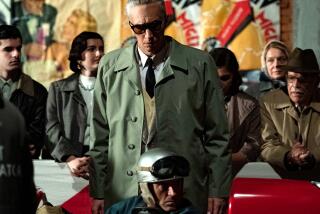He’s Manager, Prisoner of World Cup : Soccer: Italy’s Luca Cordero di Montezemolo is consumed by details in a land of procrastination.
- Share via
ROME — Luca Cordero di Montezemolo, a man waiting for a whistle, is unabashed embodiment of Italy future and Italy past.
“I’m a full-of-contradictions kind of guy,” di Montezemolo mused one recent morning in the frazzling countdown for the 1990 World Cup. He directs preparations with a blend of high-tech drive and old-world patience, wheedling harmony from a nation of brilliant but obstinate soloists.
“I laugh when somebody thinks that a soccer ball can change tradition, mentality, procedure, bureaucracy,” he said. “We will be ready, as usual, but my opinion is that in the work up in Italy, a miracle happened.”
Getting a nation of 57 million individualist soccer fanatics and their bickering politicians to play together has been a four-year crusade for di Montezemolo. He’s a polyglot, resolutely modern and worldly wise executive who is on the one hand all international big business, and on the other assertively close to his roots.
“I like the world, but I feel very, very Italian,” he said. “I love the small parts of my country: Tuscany, Capri in the winter. I don’t like big towns.”
Di Montezemolo brought newfangled managerial initiatives to this biggest of World Cups, and he brought down-home tradition of the sort that tells him it would be inviting bad luck to plan a post-tournament vacation.
“I am very superstitious. I don’t want to make plans in advance,” he said. “We hope things are done--at least medium rare--not well done, because in Italy it’s impossible to make everybody happy. . . . My feelings have changed often, like day and night, but I’m . . . optimistic.”
All the planning gets its acid test later this week when the whistle blows for an inaugural game between defending champion Argentina and Cameroon in Milan. Di Montezemolo will remain at razor’s edge until the surviving two of 24 competing national teams meet in the final July 8 in Rome.
“There’s still a lot to do,” he said. “It’s a big mosaic and every aspect of it must go well. We keep our fingers crossed because there are still a lot of delicate aspects to cover. Believe me, to organize this event of 52 matches in 12 towns in one month in our country is not very easy.”
At 42, sandy-haired, wiry Luca di Montezemolo is a natural for Italy’s most visible encounter with the world since the 1960 Olympics: a home-loving Italian and a slick international operator whose expertise is management, communications and sports.
The combination was, di Montezemolo concedes, barely enough in a country where Latin temperament and 2,000 years of tradition decree that all truly important things are left until the last minute. Italy knew for eight years that it would be the host country but, in a welter of changing national and local governments, the enabling legislation funding preparations was not passed until 1989. Di Montezemolo’s arms rise skyward in that palms up gesture meaning, “That’s the way it is,” that all Italians learn in the womb.
Born in Bologna, scion of an ancient and noble, cardinals-in-the-blood northern Italian family, di Montezemolo is a Rome-trained lawyer who did an additional two years of international commercial law at Columbia University in New York.
“The best two years of my life,” he calls them.
He is, by almost all accounts, a favorite of industrialist mogul Gianni Agnelli, the Mr. Italy president of the giant Fiat automotive empire. Much of di Montezemolo’s career has been spent under Agnelli’s wing. Di Montezemolo went to Fiat in 1975 in public relations after a stint as assistant to Enzo Ferrari and director of auto racing for Ferrari.
In 1981, at 36, di Montezemolo became director of an Agnelli holding company that controls the Fiat group’s huge publishing ventures. Three years later, he moved to Switzerland as director of Cinzano International, a company best known to Europeans for its white and red aperitif vermouths. By 1985, he was shopping for a challenging job in Rome, where his parents live.
“I wanted a serious job in Rome, and this was theoretically a serious job--so I came,” he said. “For me it was interesting to put together my background experience in such a big event. I wanted a job outside a private company, and for me it is useful to understand the big problems we face in Italy, translating projects into reality. This is the biggest problem in our country.”
His salary as manager of Italia 90 pays 400 million lire a year--about $340,000.
To finance Italia 90, di Montezemolo persuaded eight Italian corporate giants to pay big up front as sponsors and also got their know-how and the loan of bright young executives to form his brain trust. He vigorously licensed the stick figure World Cup logo to other companies, sold tickets to games even before anybody knew who would play in them--and the money came rolling in.
“We didn’t borrow a single lire, “ he said. “We didn’t buy one line of advertising. We have sold more tickets than we have anticipated--and we will finish in the black.”
Di Montezemolo, a divorced father of two whose current companion is Edwige Fenech, a raven-haired Italian actress and television personality, is a born-to-it pillar of the Italian entrepreneurial aristocracy: a member of the board of Ferrari, the Fiat-owned Turin newspaper La Stampa; and vice president of Juventus, Fiat’s major league soccer team in Turin.
If the Italia 90 job has been challenging, di Montezemolo has also found it constraining.
“This is a very provincial job; it is not international,” he said. “I have been in this office 12 hours a day for four years, focusing on the problems of Bari, Turin, Naples. . . . I’m a curious guy and this is a fantastic moment in the world, not only in the East, but all over; and here I was working in the stadiums, working with problems like lights, discussing with city and government officials. I couldn’t go on a holiday anywhere--the States, Russia. Believe me, it was a prison.”
The sentence is up July 9. After that, di Montezemolo has no next job, but bright prospects if the cup comes off successfully. He’s thinking about a book, and he’s thinking about a vacation--just thinking.
There are stray quiet moments when Luca di Montezemolo imagines that it’s all over: He sees himself, in mid-July, zooming through the American heartland, where soccer is still a kids’ game, letting it all hang out astride a big motorcycle. A dream, but no plans; not until after the final whistle blows in Rome.
More to Read
Go beyond the scoreboard
Get the latest on L.A.'s teams in the daily Sports Report newsletter.
You may occasionally receive promotional content from the Los Angeles Times.






